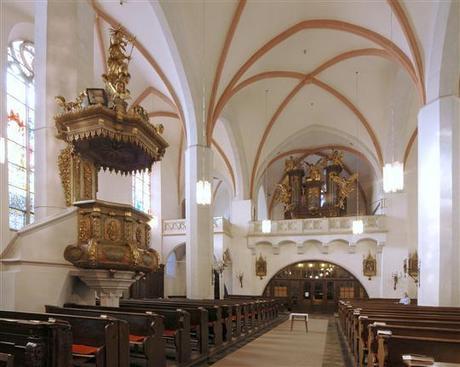
Recording venue: St. Jacob the Greater, Jihlava
A disc entitled Mahler Contemporaries is as a siren call to me. I am always fascinated by music that doesn't fit easily into categories of the romantic or the modern, experimenting and exploring possibilities. I wondered, I confess, how a CD devoted to such music would acquire its coherence. Mahler Contemporaries, recorded live at a Mahler festival in 2014, doesn't impose much external structure on its offerings, instead allowing the wide range of musical styles to speak for themselves. I found the resulting listening experience stimulating and enjoyable, although I would have appreciated more thorough liner notes, which were limited to potted biographies of the composers. I also suspect that the recording technology may have flattened the acoustics of the church where the works were performed. Including Strauss and Schoenberg, and ranging far beyond them, the disc offers rarities that should be welcomed by all those who (like me) are always complaining that there isn't enough weird central European romanticism being programmed by the concert and recital venues of the world.I was particularly glad to make the discovery of several new-to-me composers. (Since research revealed them to be also responsible for operas, I was also visited by compunction for not having known about them before.) Czech composer Josef Bohuslav Foerster figures prominently, with his haunting setting of the Stabat Mater opening the disc. The performance of the disc's lone sacred work by the Choir Association Campanula Jihlava was lucid and involving, and pleasingly free from heavy-handedness or sentimentality. I was also fascinated by the excerpts from Foerster's Lieder der Dämmerung, a loosely linked cycle setting poetry by authors from Heine, to Rilke, to Verlaine. Here as elsewhere, Ladislava Vondrácková played with limpid sensitivity. The lieder of Carl/Karl/Károly Goldmark were also new to me, and sung by Petra Froese with admirable clarity of diction. Although she had a tendency to drift slightly flat, I appreciated being able to understand every word.
Alphons Diepenbrock is the CD's third best represented composer, and was (Really Shameful Confession) equally unknown to me. His lieder--even "Der König in Thule"--were much brighter than those of the other composers represented, despite being written for baritone, here Felix Rumpf. On repeated listenings, I kept expecting to suddenly find disturbing undercurrents, and didn't. The contrast to Bruno Walter's moody "Der junge Ehemann" (von Eichendorff, and, yes, that Bruno Walter) is notable. Nestled in among the rarities are a few gems from my favorite composers of weird romantic/modern lieder. Hugo Wolf is represented by the delicate "Zitronenfalter im April" and the yearning "Blumengruß," while Schoenberg gets the surprisingly full-bodied romanticism of "Hochzeitslied." Strauss's "Ruhe, meine Seele" was given with an unusual restraint, which I confess I was not quite convinced by; if restrained, I feel, Strauss should at least be taut with the effort of that restraint. I was delighted to find Pauline Viardot alongside the other composers, with her febrile, ardent "Die Beschwörung." To me, the disc feels like a cornucopia. It may be unlikely to make converts to the art of lieder--it's all so deliciously unusual--but it may provide aficionados with happy discoveries.

